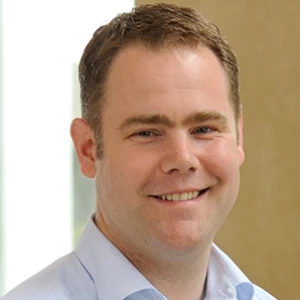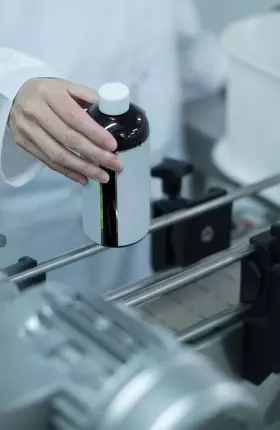Sanofi is one of the world’s largest biopharmaceutical companies. Headquartered in France, it is both a leader in the development and production of pharmaceutical drugs across numerous therapeutic areas—including immunology, rare diseases, multiple sclerosis, oncology, diabetes, and consumer health care—and the world’s largest producer of vaccines.
This past March, CEO Paul Hudson sat down with BCG’s Torben Danger to explain Sanofi’s bold new “Play to Win” strategy and the role of AI in facilitating innovation in drug discovery and development. They also discussed Sanofi’s new mRNA Center of Excellence as well as the company’s commitment to climate, sustainability, and social impact. Edited excerpts of their conversation follow.
In 2020, you launched a very bold program—Play to Win—around growth, innovation, leadership, efficiency, acceleration, and redesigning the way Sanofi works. Tell us about the program and the boldest changes you’ve made.

Torben Danger
This is a modal window.

Torben Danger
Hudson: We made a decision to renew our vows for science—to do something incredible for patients. We changed the purpose of the organization: We chase the miracles of science to improve people's lives. We wanted to double down on digital, CSR (corporate social responsibility), and DEI (diversity, equity, and inclusion).
Even in that short period of time, we have gone from a company with a very modest number of launches to numerous successes in RSV (respiratory syncytial virus) for infants—after a terrible RSV season for parents last year—and the other in hemophilia A to give people almost a normal life back, as well as one for type 1 diabetes. This is the first time we've had three first-in-class, best-in-class medicines in the same year. We have nine pivotal clinical trial readouts. We have two major readouts, one in COPD and one in MS. And we have 27 early- to mid-stage readouts
We renewed our commitment to society. We’ve worked very hard in getting to net zero. We’ve really modernized the way we use renewable energy.
For DEI, we're determined to be representative of society. This doesn’t just mean setting targets on gender in executive leadership positions, but also being much more inclusive and recognizing that we haven't won for patients if our company doesn't look and feel like the society those patients live in. I'm really thrilled with how we've done that.
The other key piece of the Play to Win strategy focuses on using AI to enhance what we do and simplify what we do. But we want everyone to benefit. How do we do that in a format that is inclusive and interesting and allows them to put their energy into insights and action and less into analysis and excel?
We need what I call “snackable AI,” making it available for everybody. I don't need to know how to program in Python, but I would like my effort to be amplified with some suggestions from AI. We have 8,000 users with AI now every single day.
You’ve also built a large digitalization center here in Paris. Tell us about the role it is playing in your digitalization journey.
Hudson: We took a big space in WeWork and cross-pollinated it with people from the company as well as people from consumer marketing, digital and data, and streaming services. We wanted to put people together to solve some of the challenges that we think are important for us.
We typically start where the doctor meets the patient, but we wanted to start a bit earlier. When people were starting to return to offices in Paris, you couldn't get a seat at the center because there's a common purpose in doing something incredible for patients and in turn for the company and the people who work there—things that have never been done before in pharma. When our chairman visited recently, he said, “This is crazy good!” That's when you start realizing that we're doing really super work.
You've also made some bold changes in the portfolio. You’ve spun out Euro API, which is as an active pharmaceutical ingredient leader worldwide. What was the thinking behind that move?
Hudson: We've made some bold choices. One of them was exiting cardiovascular and diabetes as primary research, which we decided to do in 2019 because we didn't think we could do something that had never been done before. That's important to us. We're brilliant at chemistry, but we were also making a lot of active ingredients for other companies. While it's important work, it's not really our fundamental work or the pursuit of science.
There's a fundamental emerging trend of health sovereignty, particularly in Europe. Countries in Europe want to have active pharmaceutical-ingredient players on the ground there, just in case. We saw how difficult it was when countries went into shutdown. It told us all that some health sovereignty is important and it felt like the right moment to be able to make sure patients got medicines. I’m very proud of how the spinoff went. It was a statement of what you can do with really brilliant people.
The whole world has been talking about mRNA for two or three years now. You created a Center of Excellence for that technology. What was the thought behind that?

Torben Danger
This is a modal window.

Torben Danger
Hudson: We started to ramp up our mRNA—not in time for COVID 19, recognizing that in a pandemic, speed will be the winner. In the future, we might want to deploy that tech if mRNA works. And it has worked, but it's not perfect. It's not as durable as people would've hoped. We were happy to lose as long as somebody won, because it mattered that we got the world back to normal and protected people, particularly vulnerable people.
So you'd think, "Well, why are you persisting?” We wanted to take mRNA further to see if it could change the game with influenza. It's a big challenge. We'll take it into acne. Thirty million Americans are suffering from that, mostly teenagers; it’s highly detrimental emotionally.
But the real magic of the Center of Excellence is where we bring together R&D folks to take on non-viral vectors, mRNA versus AAV (adeno-associated virus), and we can start looking at things like gene editing. We can look at moving in vitro CAR T to in vivo. This is incredible. This is science fiction meets science fact. We take the learnings from mRNA, from COVID, and we say, "Where is the puck going and how can we be ahead of it?" We have two major centers of excellence—one in Boston, one in France—and the energy there is insane. The work being conducted on non-viral vectors won't come fast. In three, four, five, six, or seven years, we'll start to see transformational therapies. It will have come out of the intensity around COVID, because we learned more than we could ever possibly have imagined in a short period of time.
We looked at mRNA and asked, “Can we go after what was previously considered undruggable opportunities?” There's a responsibility; if we can do something, we can be first. We can be best. What does it mean for those young lives? It means a normal life. It means a life free of stigma. I've been in the industry 32 years. That’s what gets me jazzed every day—even on the tough days.
What is your agenda on climate and sustainability? I know you have a net-zero ambition and goals. How do you think about that as a company?

Torben Danger
This is a modal window.

Torben Danger
Hudson: Our ambition exists on a couple of levels. One is the poster by the elevator that every company has. I've touched on it already, which is “Neutral by ’30, net zero by ’45.” For our industry, most of our carbon emissions are Scope 3. We're going to almost 100% renewable energy in France, which is the majority of our manufacturing sites. We've been on this for a while. Wastewater reuse, solvent reuse. We're doing real work.
But we just got to a different level. We have to say to ourselves that during COVID, the world stopped. Air quality improved, the positive impact on the planet was noticeable. There is hope.
I personally am involved, and it's a real calling for me. I'm part of the sustainable markets initiative with King Charles in the UK, working with a number of CEOs to say that health care is 5% of the emissions, which is more than airlines. Half of that is the delivery of health care. Patients get in their car, drive to the inner city, can't park, drive around, go to hospital. Hospital is overheated or over-cooled, and is well-lit 24 hours a day. We learned during COVID that you can hybridize your relationship with the patient, seeing them both virtually and face-to-face. That single action could knock 1% or 2% off of global emissions.
I’ve played a part advocating for that, campaigning for that at COP27, soon to be COP28. I think we need the work, the big work, the work by the elevator, the poster—but we need the day-to-day work that everybody feels responsible for at every level.







